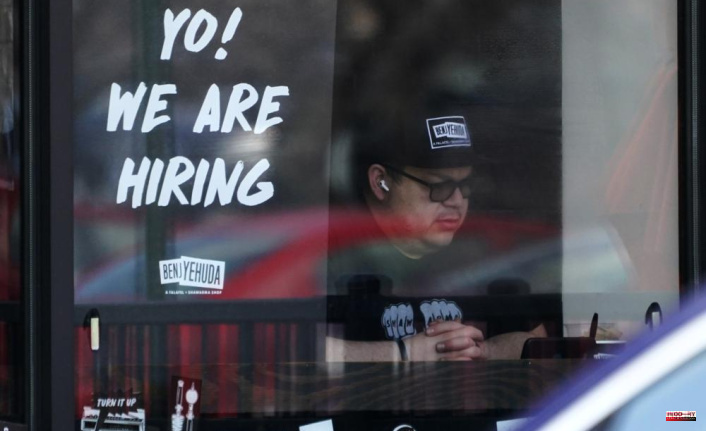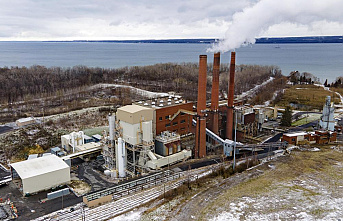Employers in the United States added 390,000.00 jobs in May. This extends a streak that has seen solid hiring, which has helped to boost an economy facing rising interest rates and high inflation.
The increase in employment last month is a result of a strong job market, which has so far managed to ignore concerns about the economy's future as the Federal Reserve raises interest rates to combat inflation. Friday's Labor Department report said that the unemployment rate was 3.6%. This is just above the half-century mark.
Although May's job growth was healthy, it was still the lowest month-to-month gain in a whole year. It was still high enough for the Fed to continue to pursue the most rapid series of rate increases in over 30 years. The government's jobs report prompted a fall in stock market indexes Friday.
Many businesses in many industries are still desperate to hire, because customers continue to spend freely despite increasing concerns about inflation. Americans have enjoyed rising wages and a large amount of savings, especially by households with higher incomes, which has helped to buoy their finances.
Mark Vitner, Senior Economist at Wells Fargo, stated that "Given all of the talk about recession and economic headwinds it was very reassuring seeing a solid job number."
Vitner stated that one encouraging sign was the broad-based nature of hiring across most sectors of the economy.
He said that when the economy loses momentum, only a few sectors tend to hire, and that's not what's happening today.
In May, workers were added in nearly every major industry. Retail, which lost nearly 61,000 jobs in May, was the exception. Target and Walmart, two of the largest retailers, reported disappointing earnings and sales. Walmart claimed it had overhired its staff and then cut its head count by attrition.
The 36,000 new jobs created by construction companies is a good sign for Americans who bought homes but haven't been built due to labor and parts shortages. 47,000 new jobs were added by shipping and warehousing firms, which are still struggling to keep pace with the growth of online commerce. 84,000 people were employed by restaurants, hotels, and entertainment venues.
Friday's report revealed that more Americans left the workforce last month and found work. This is a sign of rising wages and abundant opportunities encouraging people to seek employment. However, the percentage of people looking for work or who have a job is still lower than pre-pandemic.
Some might have taken up jobs due to rising prices: Last month's increase in the number of 55-year-olds who were employed was a sign that older Americans may be "unretiring" after being laid off or leaving their jobs during the pandemic.
The average hourly wage rose 10 cents to $31.95, according to the government. This is a good gain, but not enough to keep pace with inflation. Hourly pay rose 5.2% in May compared to 12 months ago, a decrease of 5.5% from April's 5.5% gain year-over-year and the second consecutive drop.
However, moderate raises in pay could help to ease inflation and sustain growth.
Workers are enjoying a near unprecedented level of bargaining power. Six months ago, the number of people quitting their jobs has reached a new record. This is usually for higher-paying positions. The number of layoffs is at its lowest point in 20-year records.
There are signs that companies are beginning to reconsider their demands for higher wages, despite rising labor and parts costs.
Jackie Bondanza is the CEO of Hounds Town. The chain has 30 locations across 14 states. Bondanza stated that people are applying to the company's headquarters at Ronkonkoma in New York with no relevant experience but are seeking high salaries.
She said, "People are asking for 30% more." "We don't have the money to pay too much for someone."
Bondanza will continue to hire to support the company’s growth. Hounds Town expects to open 50 franchised outlets within the next 18-months. Three jobs are available, including one as a training director, and one as a marketing director. The company now employs 17 people at its corporate headquarters, compared to five last year.
She said that inflation has not discouraged most customers from using the company's services, including daily care for dogs or boarding.
Bondanza stated that she is seeing more dogs at her facility than any of the stores can handle.
Tom Gimbel is the chief executive officer of LaSalle Network in Chicago. He said that his clients are still keen to hire new employees and offer solid wages. They are also more selective about applicants for jobs.
His firm made it clear to all companies that they would need to pay more after the pandemic. Now, the firm is warning job seekers that they might not get the big raises they want, due to the high costs that many companies are facing.
Gimbel stated, "We are now getting to a normalized, healthier place."
Reuters reported Friday that Tesla's chief Executive, Elon Musk was contemplating laying off 10% of its workers. This caused the stock price to plummet. Musk sent executives an email in which he expressed concern over the economy and said that he would "pause all global hiring."
Ford Motor Co., however, announced Thursday that it plans to create 6,200 new jobs in three states as part of its expansion of electric car production.
Inflationary pressures are being created by the strength of the national job market. As wages continue to rise, companies pass on some of the increased labor costs to customers through higher prices. Costs of food, gas and rent - which are more expensive for lower income households - are increasing at an almost unprecedented rate in the past 40 years.
As a result of soaring demand for cars, furniture and electronic equipment, inflation began to rise last year. Overloaded supply chains and parts shortages caused overcrowding. In recent years, prices for services such as hotel rooms, airline tickets and restaurant meals have increased as Americans shift more of their spending to these areas.
The Fed raised its short-term interest rate by half-point last month to 0.75% to 1.1% in an effort to curb inflation and reduce spending. This is the largest hike since 2000. In July and this month, two additional rate increases of half-point are planned. In recent speeches, Fed officials suggested that they might increase the rate by half if inflation does not slow down.
Already, the Fed's actions have pushed up mortgage rates sharply and caused a drop in home sales. Businesses may also be affected by rising borrowing costs due to the rate hikes. They might reduce their investment in equipment and buildings, slowing down growth.









